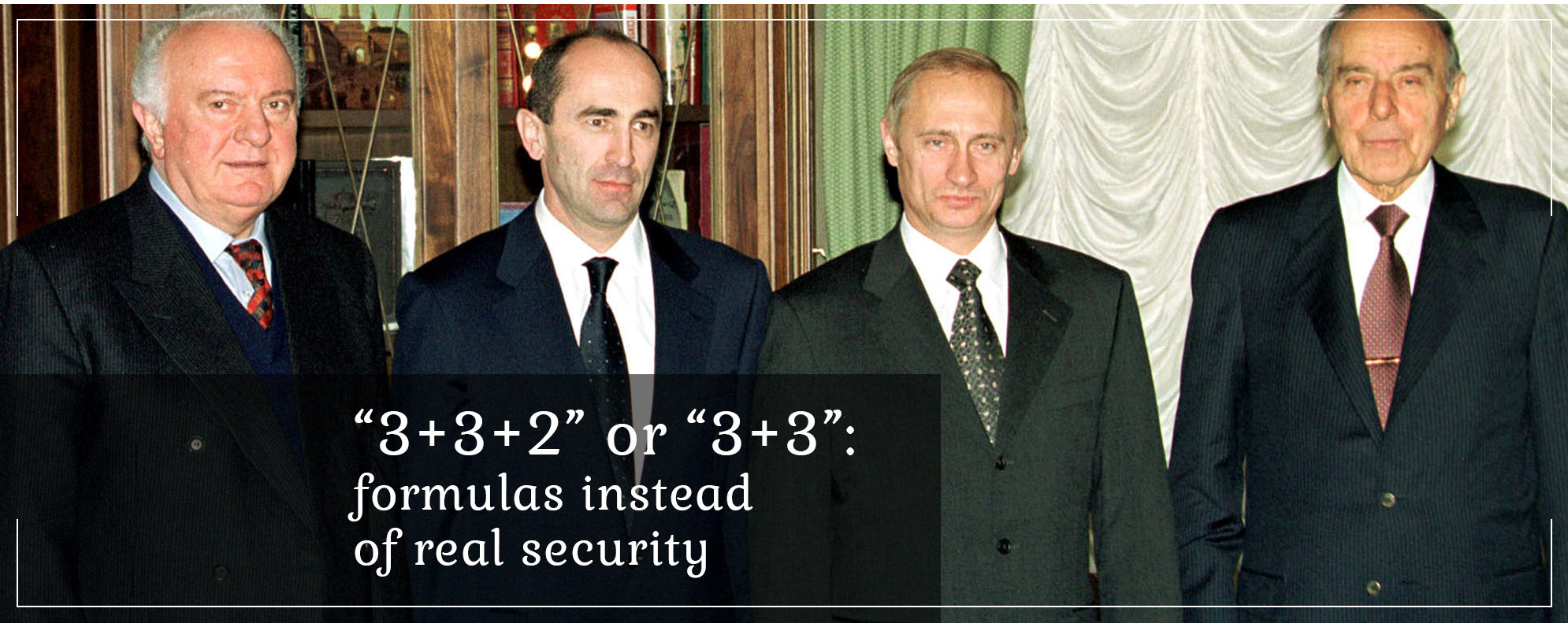
One of the outcomes of the 2020 war was Russia’s agreement to Turkey and Azerbaijan’s proposal to establish a “3+3” mechanism - three South Caucasus countries and three neighboring countries (Russia, Turkey, Iran). Over the past 4 years, only two meetings have been held within this format: in Moscow and Tehran (both meetings were ignored by Georgia).
We decided to remind that a quarter of a century ago, Armenia proposed a “3+3+2” format.
“The contradictions between the United States and Russia are more acute today than ever before. In the event of a new confrontation between the two, we will be forced to reluctantly abandon the principle of complementarity in foreign policy, and sooner or later we will have to choose between the United States and Russia.”
It is hard to believe, but these words were uttered not in our days, but 25 years ago. Armenian Foreign Minister Vartan Oskanian made this statement in December 1999. He noted that the situation in the region was changing rapidly and was fraught with dangerous and undesirable consequences. This prompted the minister’s visits to Moscow and Tehran, where Oskanian discussed with his counterparts the prospects of creating a new regional security system, which, according to him, could be formed by Armenia, Azerbaijan and Georgia, along with Russia, Turkey and Iran.
At the same time, Oskanian categorically denied any assumption that Armenia was attempting to contribute to the creation of a new pole represented by Russia and Iran. “We are striving to abandon poles altogether, which is why we propose involving all countries of the region in the security system,” he said.

A few months later, speaking at the Georgian Parliament in March 2000, Armenian President Robert Kocharian presented a modified formula for a regional security system:
“In our view, the future collective security system in the South Caucasus region will only be effective if it is truly comprehensive and integrated. Such a system should not exclude the participation of any powers with direct influence on the region. The 3+3+2 formula we propose includes all three South Caucasus states, the immediate neighboring states, namely Russia, Turkey and Iran, as well as the European Union and the United States.”
He stated that in its approaches to the issue of collective security system in the South Caucasus Armenia proceeds from historical and current geopolitical realities and the fact that “the region today is one of the weakest links in the overall system of European security.”
In 2001, Secretary General of the Council of the European Union Javier Solana commented on the Armenian “3+3+2” formula in an exclusive interview to Mediamax:
“All the countries mentioned have a role to play in establishing long-term security and stability in the region. We constantly talk about the need for closer cooperation within the region itself, but partners from outside must also work to support these goals. It is important to realize that security in the South Caucasus is not an isolated problem.”

Solana noted that “the tragic events of September 11 in the United States have shown that the need for security cooperation goes far beyond cooperation at the regional level.” “The creation of a global anti-terrorist coalition is a huge challenge for us, but at the same time it creates opportunities to set aside old differences and focus on joining forces. This is a clear chance for the South Caucasus,” Javier Solana emphasized.
Earlier, in 2000, at Mediamax’s request, Edward Djerejian, Director of the James Baker Institute for Public Policy at Rice University, one of the most experienced and authoritative American diplomats close to the Republican Bush administration, also commented on Kocharian’s proposal to create a regional security system:
“The division of the South Caucasus into rival military and political allies will lead to serious destabilization in the region. I find NATO’s expansion in the South Caucasus problematic. It would exacerbate Russia’s anxiety about NATO expansion in Europe and revive its historically ingrained fear of being surrounded. And the fact that Armenia could be influenced by Russia does not serve its long-term interests. So I agree that the best way forward for the countries of the South Caucasus is to work toward a regional security system.”

At the same time, he noted that “we need to be realistic - the regional security system in the South Caucasus can be formed only after the settlement of the Karabakh conflict.”
In May 2003, Iranian Foreign Minister Kamal Kharazi arrived in Yerevan as part of a regional tour. During the talks in Yerevan, Baku and Tbilisi, the Iranian minister emphasized regional security issues.

“Tehran is for creating a regional security system in the Caucasus according to the “3+3” formula (Armenia, Azerbaijan, Georgia, Iran, Turkey, Russia),” Kharazi said in Yerevan. At a meeting with Robert Kocharian, the Iranian minister emphasized that “security problems in the Caucasus should be solved by the countries of the region independently.”
Georgia and Azerbaijan reacted rather coldly. Azerbaijani Foreign Minister Vilayat Guliyev reminded that Azerbaijan and Georgia were pursuing integration with NATO and the EU. “Therefore, a serious security system in the Caucasus is impossible without the participation of Euro-Atlantic structures,” the Azerbaijani minister emphasized.

There has never been a lack of initiatives and formulas for regional security in the Caucasus. However, quantity has never translated into quality. The primary reason, both then and now, is that practically, the potential participants in the regional security system consider one another as “threats.”
Ara Tadevosyan
Photos from REUTERS, Photolure, UN and Aurora iniatitive archives were used in this chapter.



